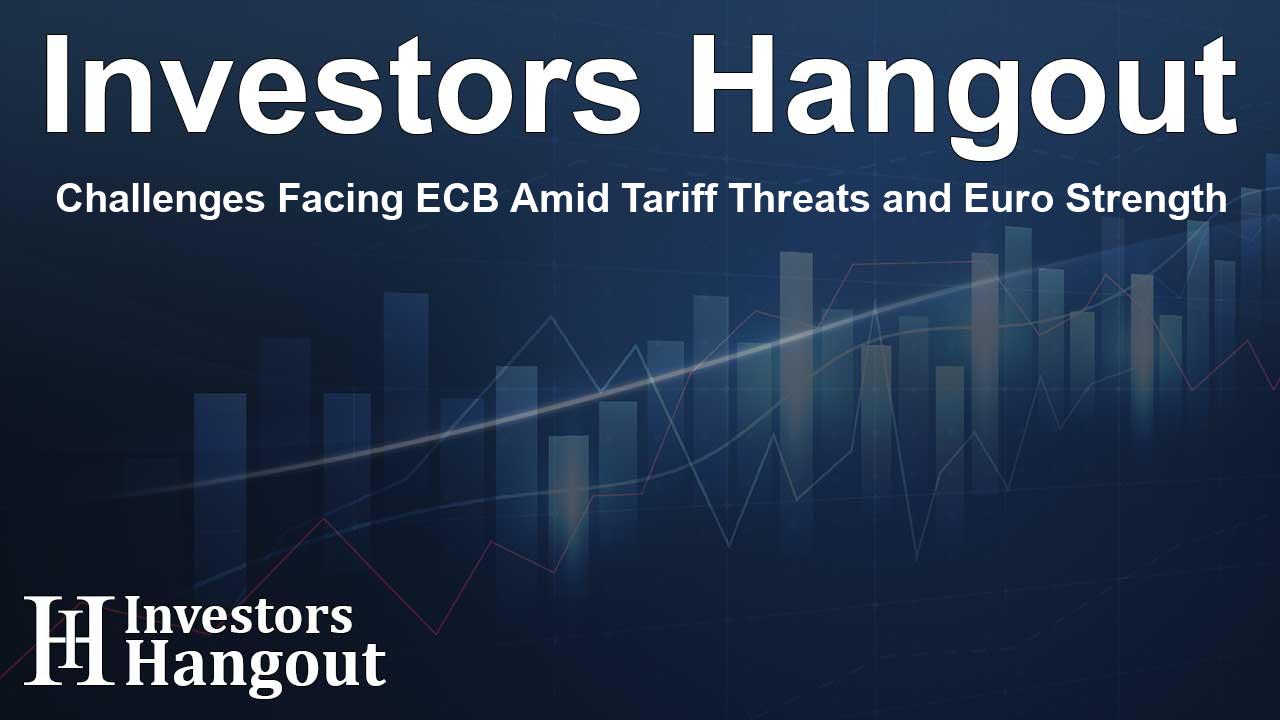Challenges Facing ECB Amid Tariff Threats and Euro Strength

Challenges Ahead for the ECB Due to Economic Pressures
With recent moves to adjust the main policy interest rate to 2%, the European Central Bank (ECB) anticipated a period of stability, aiming for a typical wait-and-see approach in monetary policy. However, the landscape has changed as external pressures threaten this stability, particularly the upcoming tariffs and the strengthening of the euro against the dollar.
The anticipation surrounding the July ECB press conference for a summer lull has been dashed as new factors come into play. The central bank’s optimism has been challenged by increasing tariffs for Europe and a stronger EUR/USD exchange rate, pushing the ECB's previously comfortable position into a more precarious one.
Impact of a Stronger Euro on Eurozone Economy
In recent months, the euro has seen a significant increase in value, appreciating roughly 15% against the U.S. dollar since the start of the year. This appreciation is a notable development, as it continues to shape the financial markets. In addition, a 2% rise since the ECB's last meeting adds to the growing concern about the implications of this exchange rate on inflation forecasts for the eurozone.
While these fluctuations might appear minor at first glance, sustained exchange rates at this level could potentially lead to reduced inflation forecasts for the upcoming years. The ECB has historically maintained that it does not target exchange rates explicitly, viewing them as one facet of a broader economic picture. This recent surge has prompted unusual commentary from ECB officials, indicating rising anxieties about exchange rate dynamics.
Vice President Luis de Guindos remarked on how levels above 1.20 USD/EUR could lead to complications for economic conditions. It’s not merely the level that causes concern, but rather the rapid pace of appreciation that typically captures the ECB's attention, which echoes sentiments expressed by past central bank leaders about swift changes impacting economic stability.
Tariff Threats Introduce Additional Complications
Compounding these exchange rate issues, new tariff threats from foreign policy agendas have emerged. President Trump's proposed 30% tariffs on European goods starkly contrast earlier assumptions of a 10% baseline and a maximum downside of 20%. Such a hike would likely have severe repercussions for the eurozone economy.
In this evolving context, it's clear that the ECB will need to navigate the delicate balance between tariff implications and exchange rate stability. As tariffs create upward pressure on inflation, the ECB may find itself walking a fine line amid increasing economic uncertainty.
Anticipating ECB's Future Policy Decisions
In light of these factors, a steady approach is the most realistic expectation for the ECB in the near future. With any potential tariff escalations likely not materializing until later, the ECB appears to be in no rush to cut rates preemptively. Their established policy favors taking action with certainty rather than responding to mere announcements.
Despite the complexities laid out, the current strengthening of the euro does not warrant immediate rate cuts, which leads us to expect the ECB will hold rates steady in the coming week. Nonetheless, the backdrop of a strong euro coupled with tariff threats is likely to foster disinflationary conditions, raising the risk of inflation undershooting its targets and precipitating future rate cuts.
While the ECB is cautious not to trigger premature reductions in rates, long-term fiscal stimulus could bring about inflationary pressures that counter current disinflationary trends. We continue to project a rate cut by the September meeting, although it seems that President Christine Lagarde's summer break might not be as tranquil as once anticipated.
Frequently Asked Questions
What recent changes has the ECB made to its interest rate?
The ECB has recently cut the main policy interest rate to 2%, aiming for stability amidst economic pressures.
What are the implications of a stronger euro for the ECB?
A stronger euro can decrease inflation forecasts, raise disinflationary pressures, and impact policy decisions negatively.
Why are current tariffs a concern for the ECB?
Increased tariffs can lead to economic strain on the eurozone, pushing inflation higher and complicating ECB policy responses.
What monetary policy approach is expected from the ECB soon?
The ECB is likely to maintain a wait-and-see approach, avoiding immediate rate cuts in the near term.
What factors might influence future ECB decisions?
Future decisions could be influenced by ongoing tariff developments, exchange rate stability, and broader economic trends.
About The Author
Contact Evelyn Baker privately here. Or send an email with ATTN: Evelyn Baker as the subject to contact@investorshangout.com.
About Investors Hangout
Investors Hangout is a leading online stock forum for financial discussion and learning, offering a wide range of free tools and resources. It draws in traders of all levels, who exchange market knowledge, investigate trading tactics, and keep an eye on industry developments in real time. Featuring financial articles, stock message boards, quotes, charts, company profiles, and live news updates. Through cooperative learning and a wealth of informational resources, it helps users from novices creating their first portfolios to experts honing their techniques. Join Investors Hangout today: https://investorshangout.com/
The content of this article is based on factual, publicly available information and does not represent legal, financial, or investment advice. Investors Hangout does not offer financial advice, and the author is not a licensed financial advisor. Consult a qualified advisor before making any financial or investment decisions based on this article. This article should not be considered advice to purchase, sell, or hold any securities or other investments. If any of the material provided here is inaccurate, please contact us for corrections.
